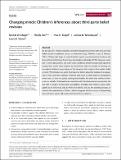Changing minds: Children's inferences about third party belief revision
Author(s)
Magid, Rachel; Yan, Phyllis L.; Siegel, Max Harmon; Tenenbaum, Joshua B; Schulz, Laura E
DownloadMagid_et_al-2017-Developmental_Science.pdf (797.6Kb)
PUBLISHER_CC
Publisher with Creative Commons License
Creative Commons Attribution
Terms of use
Metadata
Show full item recordAbstract
By the age of 5, children explicitly represent that agents can have both true and false beliefs based on epistemic access to information (e.g., Wellman, Cross, & Watson, 2001). Children also begin to understand that agents can view identical evidence and draw different inferences from it (e.g., Carpendale & Chandler, 1996). However, much less is known about when, and under what conditions, children expect other agents to change their minds. Here, inspired by formal ideal observer models of learning, we investigate children's expectations of the dynamics that underlie third parties' belief revision. We introduce an agent who has prior beliefs about the location of a population of toys and then observes evidence that, from an ideal observer perspective, either does, or does not justify revising those beliefs. We show that children's inferences on behalf of third parties are consistent with the ideal observer perspective, but not with a number of alternative possibilities, including that children expect other agents to be influenced only by their prior beliefs, only by the sampling process, or only by the observed data. Rather, children integrate all three factors in determining how and when agents will update their beliefs from evidence.
Date issued
2017-05Department
Massachusetts Institute of Technology. Department of Brain and Cognitive SciencesJournal
Developmental Science
Publisher
Wiley Blackwell
Citation
Magid, Rachel W., et al. “Changing Minds: Children’s Inferences about Third Party Belief Revision.” Developmental Science, May 2017, p. e12553. © 2017 John Wiley & Sons Ltd.
Version: Final published version
ISSN
1363-755X
1467-7687